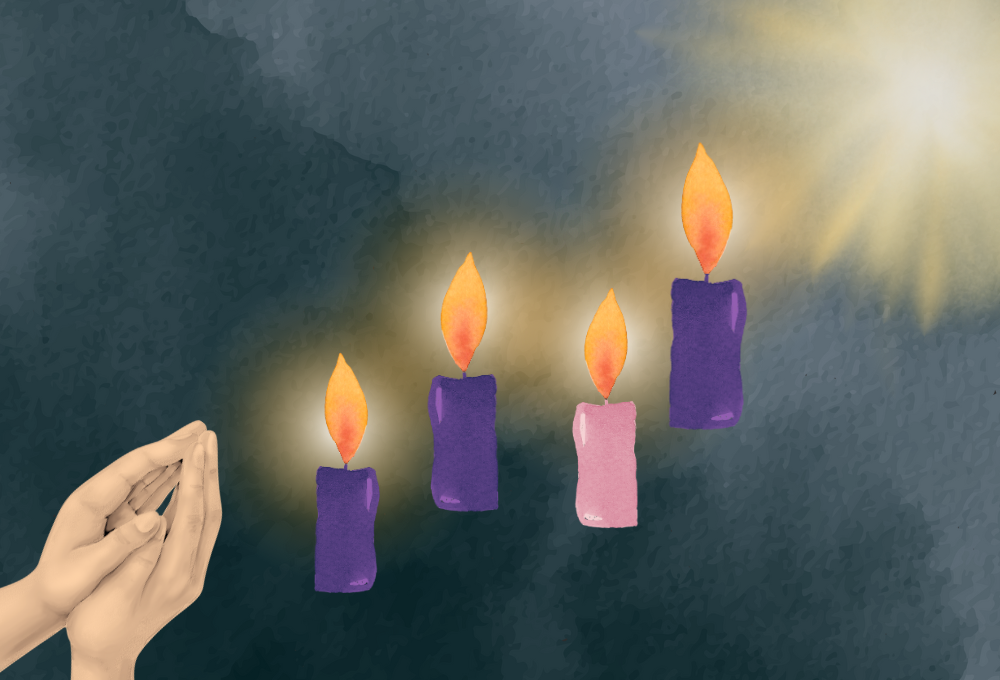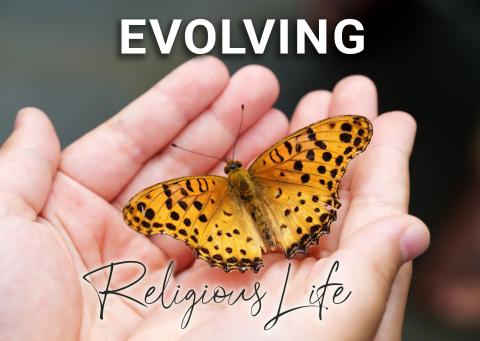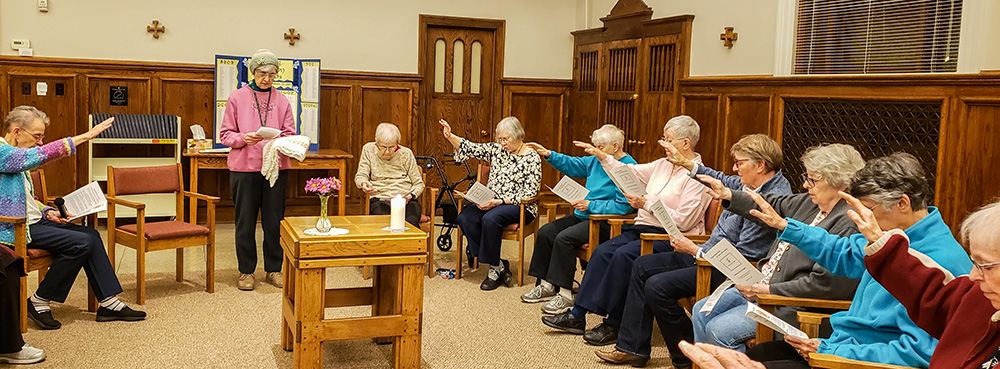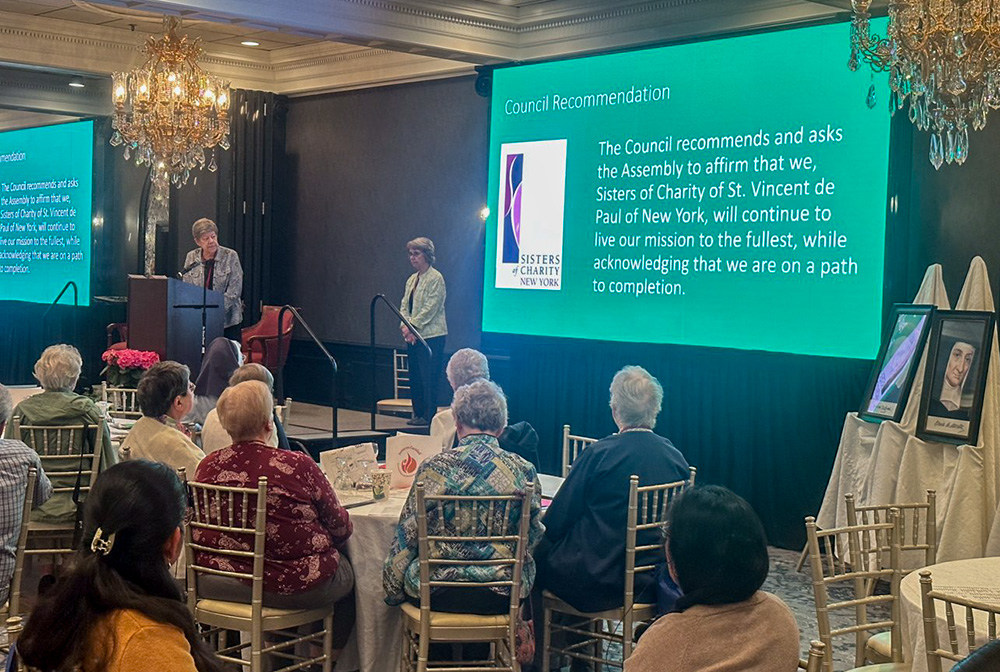
(GSR illustration/Olivia Bardo)
Editor's note: "Evolving Religious Life," a new series from Global Sisters Report, is exploring how Catholic sisters are adapting to the realities of congregations in transition and new forms of religious life. While we write often about these trends, this particular series will focus more closely on sisters' hopes for the future.

It would be easy for the Notre Dame Sisters of Omaha, Nebraska,* to be downcast: Their school was closed in the 1970s*, their focus has largely changed from outward ministry to prayer, and they are down to 27 members.
But as the Catholic Church celebrates Advent, a time of hopeful waiting, we remember that times were dark in Israel just before Christ was born. The Jewish people were under Roman occupation and their leaders had no choice but to collaborate with the Roman government. The Messiah, it seemed, was nowhere to be found.
And yet, the believers had hope — the same hope seen in the Sisters of Notre Dame.
"We feel very blessed. We certainly don't feel let down by God in any way, and that's the source of our hope," said Sr. Mary Ann Zimmer, a member of the congregation's leadership team. "It's not just about numbers; it's about the life. And there's just so much life among us."
Sr. Rita Ostry, the provincial president, said that one aspect of being hopeful is remembering what truly matters.
"Sometimes as sisters go into retirement, they say, 'Now all I can do is pray,' " Ostry said. "I say to them, 'Sister, do you realize that is the most powerful thing one can do?' "
Ostry walks every morning and prays for the world as she does so.
"That's the call of today — to be a hopeful presence," she said. "There are so many divisions and so much unrest and so much anxiety all around us. My one goal is to wake each morning with a heart full of hope and to bring a positive presence as I go through my day."
With the sun setting earlier and world filled with strife, it can be easy to forget what lies ahead.

The Notre Dame SIsters of Omaha, Nebraska, pray for Sr. Theresa Maly (third from left) at her prayer shawl ceremony, held when a sister transitions to a care facility. She is presented with a shawl that symbolizes the community's love and prayers for her. (Courtesy of the Notre Dame Sisters of Omaha)
"Advent is that time we remember 'the people who walk in darkness will see a great light,' " Ostry said. "There is a great light that shines for us each day."
Sr. Mary McCormick, a member of the leadership team of the Sisters of Charity of New York, said that when she is losing hope, she looks to the order's founders for inspiration. In April, the order announced that after more than 150 years, the community is on the path to completion. Though there are 139 sisters today, there has not been a new vocation in two decades, and the announcement was based on the decision not to accept any new ones should they appear.
McCormick noted that while we can look to history for hope, the first sisters could not.
"They were starting out on this new adventure, a new religious congregation in this new republic that was not a Catholic place and not friendly to Catholics, many times," she said. "They had no history to fall back on. We can look back, but they really had to live that hope that if this was God's desire, he would provide a way. And we are heirs to that promise."
Congregation president Sr. Donna Dodge said it brings her great hope to look at the light the sisters have brought to countless lives.
"That image means more to me now more than ever — the light in the darkness," she said. "I look at the people working in ministries we started. There's a lot of good going on in God's name and nothing's going to stop that, no one is going to stop that. As we visit some of our ministries, it's just overwhelming the dedication, the expertise, the love and the passion, the respect for the dignity of every person that passes through our ministries. That gives me hope."

Sr. Donna Dodge, president of the Sisters of Charity of New York, reads the executive council's recommendation on the congregation's "path to completion" at their 2023 general assembly. Delegates to the assembly voted unanimously April 13, 2023, to stop recruiting or accepting new members and begin a "path to completion" while continuing to live their mission to the fullest. (OSV News/Courtesy of the Sisters of Charity of New York)
McCormick said that because in many ways religious life has opened to laypeople through working or volunteering in the sisters' ministries or even becoming associates, the light the sisters witness has spread in countless ways.
"The numbers of men and women laypeople who are going to school and taking courses in theology and pastoral ministry and those kinds of things, this would have been unheard of" not long ago, she said. "So many younger people are reaching out, desiring to serve and doing incredible things; they are preparing to take their rightful place in the church."
Sr. Debbie Borneman, director of mission integration for the National Religious Vocation Conference, said people sometimes wonder how she remains hopeful when the number of vocations has slowed so dramatically. But religious life is not about numbers, she said: It is about needs.
"For some communities, coming to completion is the right decision — after all, it is called religious life, and we don't want women and men to enter communities without life," said Borneman, a member of the Sisters of Sts. Cyril and Methodius. "We do need to resize our properties and simplify our belongings. But sometimes we get so preoccupied planning for the emerging future we can forget the urgent needs of our world."
Advertisement
Borneman said a friend frequently points out that Jesus was not concerned about logistics when he fed the multitudes; he just got them fed.
"When there was a global pandemic, we had no strategic plan, but look at the way sisters responded to needs. When there was a mask shortage, they were pulling out material from closets and making masks," she said. "Sisters have a way of meeting needs. What is the greatest need, and how can we help?"
Borneman points out that Jesus was not part of the religious hierarchy of the time, and never built any churches or institutions.
"Religious life has always been changing and always been transforming," she said. "Who we are today is not who we were when we were founded."
Borneman said many of the changes being lamented today actually happened decades ago, and yet religious life is as vibrant as ever.
"Some of these changes we're talking about are not monumental, even vocation discernment," she said. "For 40 years [congregations] have been doing discernment together, and for a long time we've been doing formation together. That day when a woman entered from the school the sisters taught in hasn't been norm for the past 40 years.
"That's what gives me hope: Look at how many ways we can cultivate what's possible rather than worrying about what's ending."
Change is one of the few constants in life, she said, and that should bring us hope. Our call can change, and how we respond to the needs of the times must change.
"God doesn't call just once, he calls throughout our life," Borneman said. "We're called to be a sign of hope."
*This story and a photo caption has been updated with the correct congregation name for the Notre Dame Sisters of Omaha, Nebraska, along with correcting the date that their school closed.





